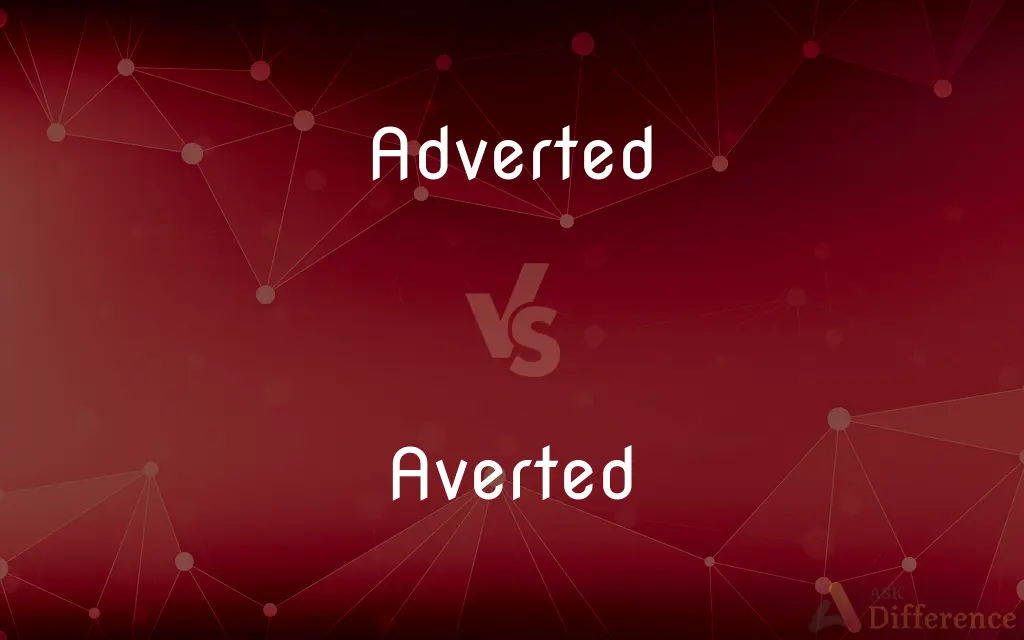Adverted vs. Averted — What's the Difference?
By Fiza Rafique & Urooj Arif — Updated on May 9, 2024
Adverted generally means to turn attention toward something, while averted refers to turning away or preventing something.

Difference Between Adverted and Averted
Table of Contents
ADVERTISEMENT
Key Differences
Adverted is often used in contexts where attention is directed toward a specific topic or detail. For example, in literature, an author may advert the reader's attention to a symbol that foreshadows future events. Whereas, averted is used in scenarios where something undesirable is prevented or avoided, such as averting a disaster through timely intervention.
In terms of focus, adverting involves engagement and consideration, which can be seen in discussions where participants are asked to advert their thoughts to a particular argument. On the other hand, averting typically involves a disengagement or diversion, as seen in safety protocols that aim to avert potential hazards.
Adverted can also appear in more formal or literary contexts, emphasizing the deliberate act of drawing attention. Whereas averted is commonly used in everyday language, relating to quick and often reflexive actions to prevent negative outcomes.
The application of adverted is somewhat less common and more specific compared to averted, which is broadly used across various contexts from everyday life to specialized fields like medicine and disaster management, where the focus is on prevention and avoidance.
The tone and implication of adverted are generally neutral or positive, as it implies an enrichment of knowledge or focus. On the other hand, averted usually carries a relief or urgency tone, often associated with escaping or avoiding negative situations.
ADVERTISEMENT
Comparison Chart
Definition
To turn attention to something
To turn away, prevent, or avoid
Common Usage
Formal, literary
Broad, including everyday speech
Focus
Engagement, consideration
Disengagement, diversion
Contexts
Literary analysis, debates
Safety protocols, risk management
Connotation
Neutral or positive
Often associated with relief or urgency
Compare with Definitions
Adverted
Relating to engaging with specific details.
The teacher adverted the students' attention to the complexity of the problem.
Averted
To prevent an undesirable occurrence.
Quick action averted the crisis.
Adverted
Used in a formal context to highlight consideration.
The speaker adverted to several key points in her argument.
Averted
To turn away from something.
She averted her gaze as the argument became heated.
Adverted
To direct attention or focus towards something.
The manager adverted to the need for better communication.
Averted
Often carries a sense of relief.
A serious accident was averted by the driver's alertness.
Adverted
Can imply enrichment or deepening of understanding.
He adverted our understanding of the historical context.
Averted
Relates to avoiding negative outcomes.
Potential hazards were averted with careful planning.
Adverted
Often appears in written or spoken analysis.
The critic adverted to the symbolism in the film.
Averted
Used broadly across different contexts.
Disaster was averted thanks to the timely warning.
Adverted
To turn attention. Used with to
The board next adverted to compensation issues.
Averted
To turn away
Avert one's eyes.
Adverted
To call attention; refer. Used with to
He adverted to the problem in the opening paragraph.
Averted
To keep from happening; prevent
Averted an accident by turning sharply.
Adverted
Simple past tense and past participle of advert
Averted
Turned away, especially as an expression of feeling; also, offended; unpropitious.
Averted
Simple past tense and past participle of avert
Averted
Turned away, esp. as an expression of feeling; also, offended; unpropitious.
Who scornful pass it with averted eye.
Common Curiosities
Can adverting be positive?
Yes, adverting can be neutral or positive as it often involves enriching knowledge.
What does averted mean?
It means to prevent, avoid, or turn away from something.
In what contexts is adverted used?
It is used in more formal or literary contexts.
What does adverted mean?
It means to direct attention or focus towards something.
What kinds of actions can be averted?
Actions that could lead to negative outcomes, like accidents or conflicts, can be averted.
Is adverting common in everyday language?
No, adverting is less common and more specific to formal or analytical discussions.
What is the opposite of adverting?
The opposite would involve ignoring or overlooking details.
How is averted commonly used?
It is used across a variety of contexts, including everyday language and specialized fields.
How does averted relate to safety?
Averted is frequently used in contexts involving safety to describe actions taken to avoid danger or harm.
What is the difference in tone between adverted and averted?
Adverted typically has a neutral or positive tone, while averted often implies urgency or relief.
Is adverting used in casual conversation?
It is less likely to be used in casual conversation, favoring more structured or deliberate discourse.
Share Your Discovery

Previous Comparison
Contribution vs. Attribution
Next Comparison
GT vs. SEAuthor Spotlight
Written by
Fiza RafiqueFiza Rafique is a skilled content writer at AskDifference.com, where she meticulously refines and enhances written pieces. Drawing from her vast editorial expertise, Fiza ensures clarity, accuracy, and precision in every article. Passionate about language, she continually seeks to elevate the quality of content for readers worldwide.
Co-written by
Urooj ArifUrooj is a skilled content writer at Ask Difference, known for her exceptional ability to simplify complex topics into engaging and informative content. With a passion for research and a flair for clear, concise writing, she consistently delivers articles that resonate with our diverse audience.
















































